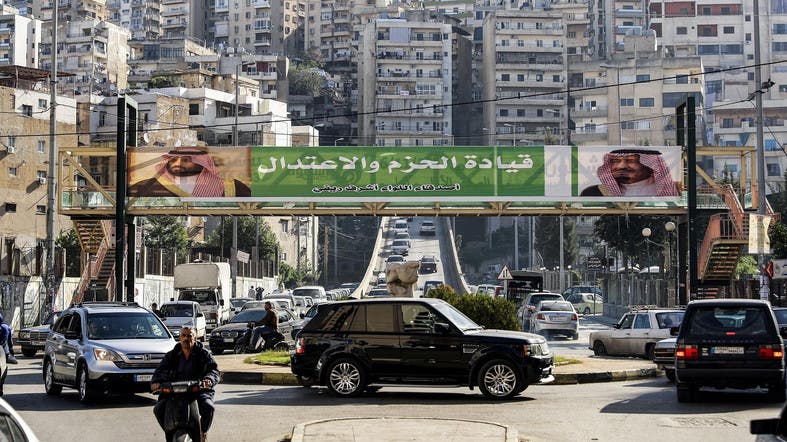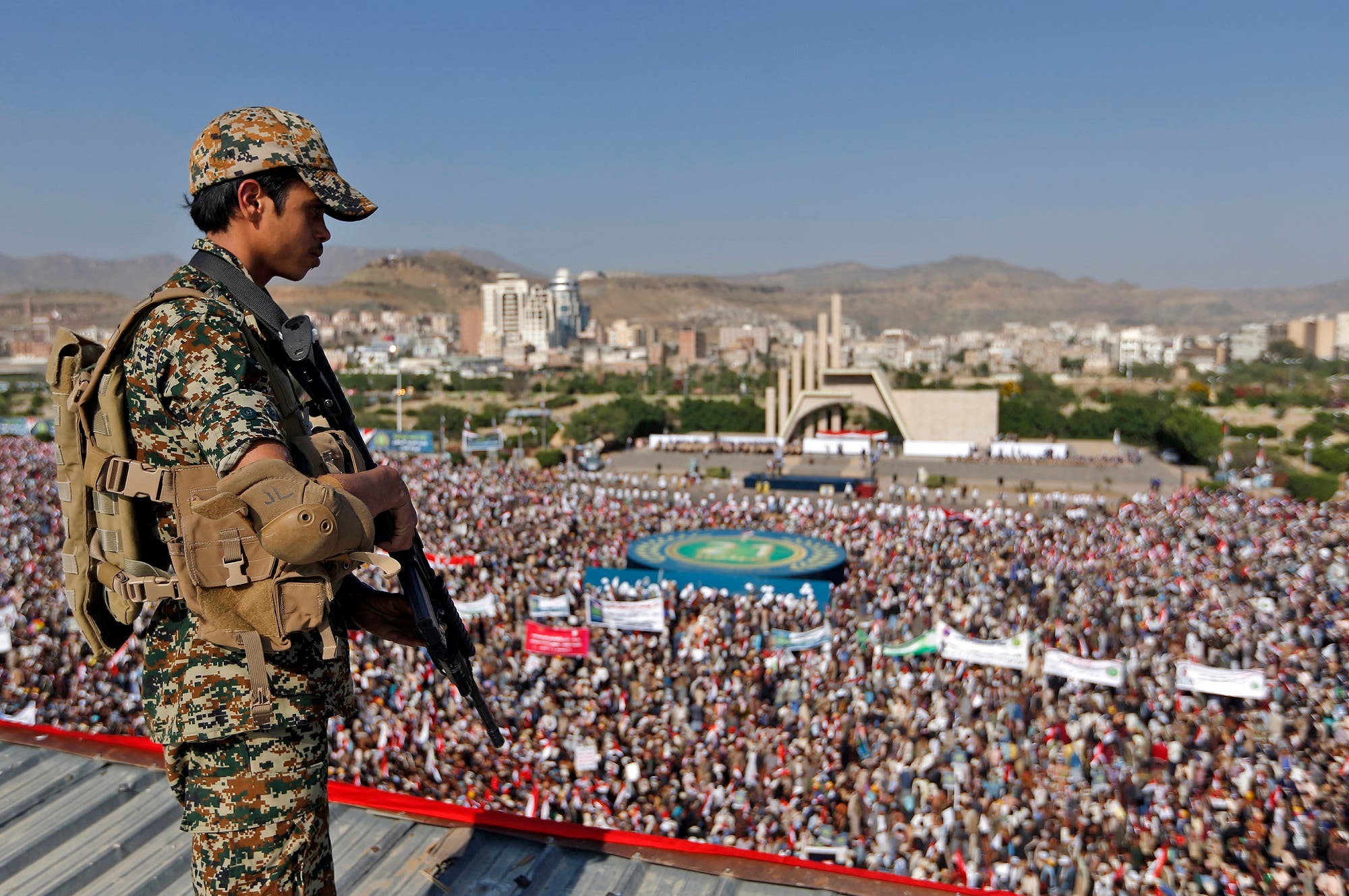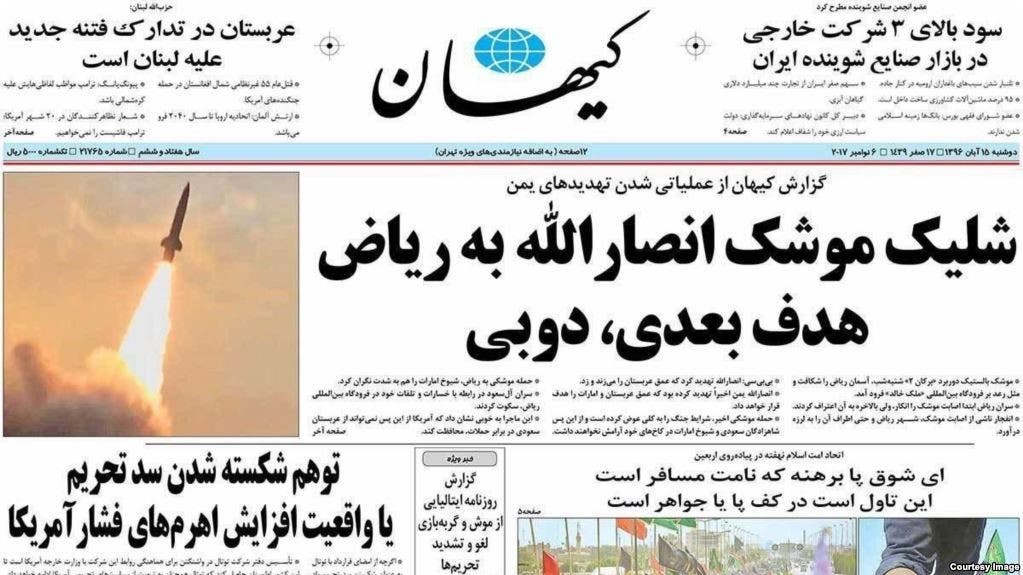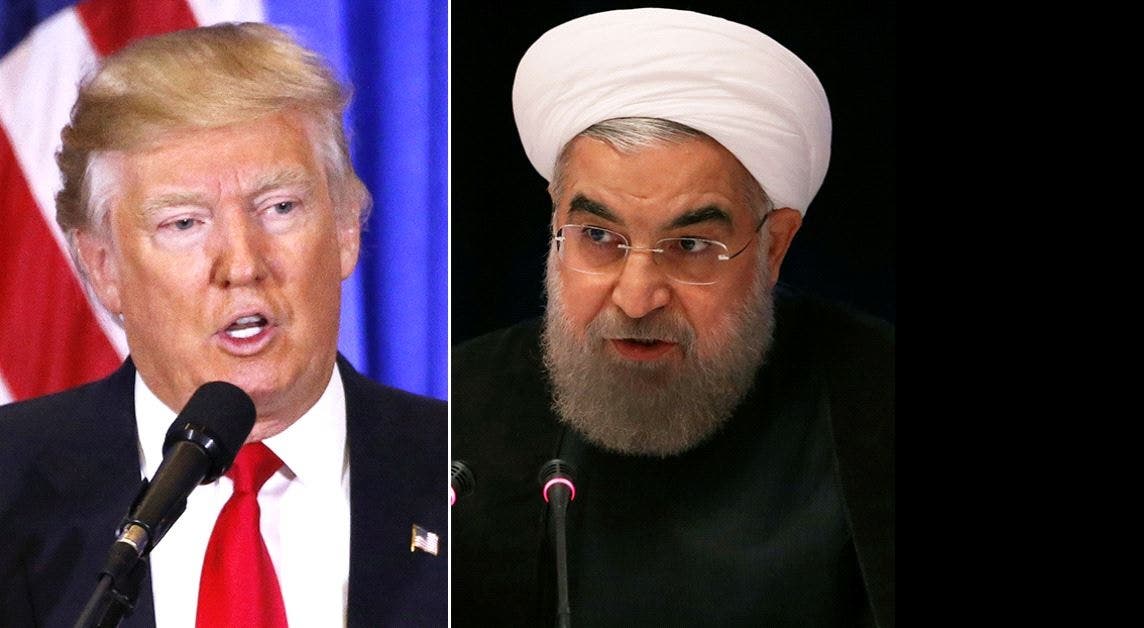ANALYSIS: Is Iran’s influence fading in Lebanon and Yemen?

This November 10, 2017 photo shows a banner bearing images of Saudi King Salman and Mohammed bin Salman in Lebanese city of Tripoli. (AFP)
Recent developments across the region are signaling increasing isolation for Tehran. Despite investing for decades, Lebanon and Yemen are literally slipping out of Iran’s hands.
Lebanese Prime Minister Saad Hariri sent shockwaves across the region by announcing his resignation. The recent missile attack by the Iran-backed Houthis in Yemen targeting Riyadh crossed a costly red line for Tehran.
Turning point in Lebanon
In Hariri’s own words, Iran and Hezbollah had literally taken the entire country of Lebanon hostage, making it impossible to carry out his duties.
Evidence also revealed an assassination plot threatening his life. Western and Arab intelligence services unveiled how his entourage was targeted, in a blueprint similar to his father’s assassination.
“Those who planned to assassinate prime minister Hariri deactivated the observation towers while his motorcade was passing by,” Reuters wired citing Al Arabiya.

Supporters of Yemen’s Iran-backed Houthi rebel movement gather in Sanaa on September 21, 2017. (AFP)
Three issues related to this development are worth pondering over:
1) Hariri announced his resignation from Riyadh only one day after his meeting with Ali Akbar Velayati, international affairs advisor of Iranian Supreme Leader Ali Khamenei, in Beirut.
2) The United States launched a new Iran policy targeting this regime’s destabilization and terrorism across the region.
3) Hezbollah has come under severe sanctions, including three bills passed by the US House of Representatives on October 25th.
a. H.R. 359 calling on the European Union to designate Hezbollah in its entirety as a terrorist organization
b. H.R. 3342 sanctioning Hezbollah for using innocent civilians as human shields
c. H.R. 3329, known as HIFPA, targets Hezbollah’s international financial support
1) Hariri announced his resignation from Riyadh only one day after his meeting with Ali Akbar Velayati, international affairs advisor of Iranian Supreme Leader Ali Khamenei, in Beirut.
2) The United States launched a new Iran policy targeting this regime’s destabilization and terrorism across the region.
3) Hezbollah has come under severe sanctions, including three bills passed by the US House of Representatives on October 25th.
a. H.R. 359 calling on the European Union to designate Hezbollah in its entirety as a terrorist organization
b. H.R. 3342 sanctioning Hezbollah for using innocent civilians as human shields
c. H.R. 3329, known as HIFPA, targets Hezbollah’s international financial support
In short, Hariri’s resignation changed all calculations for Iran in Lebanon.
A look into the past
After a long stalemate Lebanon established a government on 18th December 2016, seeing Hariri as the prime minister and Michel Aoun as president. Lebanon’s power structure and political fabrication comprises of a Christian president, Sunni prime minister and a Shiite head of parliament.
This combination provided a major advantage for Iran, carrying out all its crimes under the cover of a legitimate Sunni government. Hezbollah is attacking its dissidents in Lebanon, under the pretext of Lebanese Army operations. This terrorist designated entity is also using Lebanon’s financial infrastructure for its own benefit.
This farce legitimacy is now coming to an end. Hariri himself said the status quo could not continue.
Concerns and reactions
Iran and Hezbollah are both sensing the dangers ahead after Hariri’s resignation. “Without a doubt this resignation has raised our concerns and we did not welcome it,” said Hezbollah leader Hassan Nassrallah.
Media in Iran are known to voice the general opinion of its ruling regime. “It appears that Hariri’s resignation is the operational beginning of this strategy in the region, with the ground being paved by the US Congress sanctioning [Iran] and Hezbollah,” according to the semi-official Entekhab daily.
A shot period after Hariri’s resignation, the Houthis in Yemen launched a missile targeting the King Salman International Airport near Riyadh.
“Iran has provided the capability for ballistic missile attacks launched from Yemen,” wire services reported citing Jeffrey Harrigian, commander for southwest Asia at the US Air Forces Central Command on Friday.
“What we have seen, clearly from the results of the ballistic missile attacks, that there have been Iranian markings on those missiles, that’s been demonstrated,” Harrigian added.
One can raise three possible reasons for this retaliation by Iran:
- A response to the blow received from Hariri’s resignation.
- The Houthis are suffering a series of setbacks on the ground.
- The United Nations has proposed peace plans for Yemen. The Houthis missile launch signals Iran’s response to peace and any negotiations whatsoever in Yemen.
- A response to the blow received from Hariri’s resignation.
- The Houthis are suffering a series of setbacks on the ground.
- The United Nations has proposed peace plans for Yemen. The Houthis missile launch signals Iran’s response to peace and any negotiations whatsoever in Yemen.
The Saudi-led coalition accused Iran of launching a “direct military aggression” and declaring war, threatening possible retaliation. Article 51 of the UN Charter entails countries the right to take defensive military action in such scenarios. Saudi Foreign Minister Adel al-Jubeir said adequate action will be taken at the proper timing.
Two air strikes targeting the defense ministry in Yemen’s militant-held capital Sanaa late Friday were carried out by the Saudi-led coalition, according to witnesses and rebel media. No casualties were reported.

Iran’s Kayhan daily, known as Khamenei’s mouthpiece, printed contradictory remarks and mentioned Dubai and other sites as possible future target. (Screengrab)
Iran’s paradox
Iranian military officials, however, denied any part in the Riyadh missile attack. “We don’t even have the means to transfer missiles there,” said Revolutionary Guards (IRGC) chief Mohammad Ali, understanding the consequences in this regard.
This is the very individual who threatened all US bases in the region in the case of IRGC’s designation as a terrorist organization. The US Treasury Department blacklisted the IRGC without any such response from Iran.
Furthermore, the Houthis lack the necessary industrial capacity to manufacture light weapons, let alone ballistic missiles. Iran’s Kayhan daily, known as Khamenei’s mouthpiece, printed contradictory remarks and mentioned Dubai and other sites as possible future target.
“… where shall be the next target for long-range ballistic missile: maybe Riyadh, Jaddah, Taef and ARAMCO…,” it wrote.
International response
The ballistic missile launch is a violation of UN Security Council resolutions 2216 and 2231. UNSC Resolution 2216 bans any provision of weapons for Houthi leaders in Yemen. UNSC Resolution 2231 specifically prohibits Iran from transferring and selling weapons abroad without Security Council consent.
US Ambassador to the UN Nikki Haley called for the world body to take action against Iran in response to this ballistic missile attack. Yemen lacked such hardware prior to Iran’s support and delivery of weaponry to the Houthis.
The White House condemned the Houthis missile attacks on Saudi Arabia, adding they threatened regional security and undermined efforts aimed at halting the conflict. France and the United Kingdom also condemned these measures, followed by President Emmanuel Macron’s visit to Riyadh where he stressed on pressuring Iran’s ballistic missile program.
Consequences of appeasement
Iran and Houthis reaching the point of launching such an attack can be traced back to eight years of appeasement by the Obama administration. Despite the UNSC obligating the Houthis to handover heavy weaponry, pull forces out of all cities and transfer all administrational entities to the officially recognized government, no measures were carried out in this regard.

The policy adopted by the Trump administration vis-à-vis Iran is causing major concerns for Tehran. (Reuters)
Diplomats of former US Secretary of State John Kerry held talks with the Houthis in the United Arab Emirates and Kuwait, yet refused to receive representatives of Yemen’s legal government. The Obama administration would foster numerous ceasefire agreements, allowing time the battered Houthis to regain their momentum.
One example of the Obama-Kerry engagement policy with Iran was witnessed when the Houthis and forces loyal to sacked Yemeni president Ali Abdullah Salah advanced south with lightning speed from Sanaa towards Aden.
On March 25, 2015, in the midst of Obama’s negotiations with Tehran, Washington issued evacuation orders to US forces stationed in a large airbase north of Aden, including transferring all weaponry and hardware to the Houthis.
Times are changing
Iran enjoyed 16 years of highly flawed US policy across the region, providing it ample time to gain ample influence in four different Arab states of Iraq, Syria, Lebanon and Yemen.
Following the Riyadh Conference back in May of this year, the decertification of the controversial Iran nuclear deal and the IRGC designation as a terrorist organization, it has become crystal clear for Tehran that times are changing.
The policy adopted by the Trump administration vis-à-vis Iran is causing major concerns for Tehran. Loophole-proof implementation is now needed and signs of such measures are beginning to mushroom in Lebanon and Yemen.
Upon Saudi Arabia’s requested, the Arab League has scheduled to hold an extraordinary meeting next Sunday to weigh Iran’s regional “violations,” wire services reported. This momentum must continue abroad and rest assured Iran’s regime is sensing the growing isolation.
Last Update: Monday, 13 November 2017 KSA 08:54 - GMT 05:54
No comments:
Post a Comment